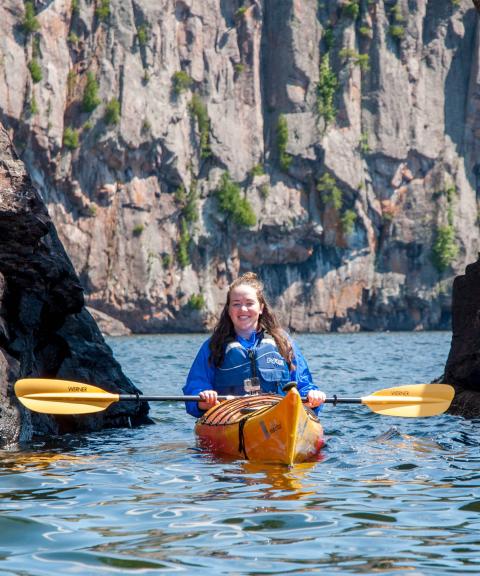
Allison Herreid ‘19G from the natural resources masters of science program has been selected to participate in the first Limnology and Oceanography Research Exchange (LOREX). The first cohort includes 27 graduate students from 24 U.S. institutions. They will collaborate with 25 labs in six host institutions in Australia, Canada, Israel and Sweden.
The Blaine, Minnesota native is looking forward to conducting collaborative, international research and expanding on some of the emerging questions coming out of her research at UNH.
Allison Herreid: I study carbon and nitrogen cycling in freshwater ecosystems and am interested in how climate and land use changes will affect these cycles and overall ecosystem function. Specifically, my research investigates how certain factors, such as water chemistry, may affect the concentration of dissolved greenhouse gases in streams.
"By expanding our knowledge of how ecosystems function and respond to change, we can begin to make policy and land management decisions that maintain healthy ecosystems."
Herreid: My interest in aquatic biogeochemistry stemmed from a passion for water quality that evolved throughout my childhood, academic, work, and personal experiences. Many people in my life were a part of these experiences and have helped shaped who and where I am today.
Herreid: Identifying and understanding drivers of greenhouse gas production is essential for improving our ability to estimate gas flux from streams and rivers. Reducing uncertainty in these estimates allows us to better understand the role of freshwater ecosystems in global greenhouse gas emission inventories.
Herreid: My initial interest in scientific research stemmed from curiosity about how the environments around me were functioning and changing. With every research project I’ve been a part of so far, the first initial question we focus our research on often ends up unfolding several new questions.
With the answers to these emerging questions often unknown, my curiosity ignites and motivates me to continue researching to see how much we can learn about the given ecosystem that we are studying. It seems that there is always something new to learn and explore, which I find exciting. By expanding our knowledge of how ecosystems function and respond to change, we can begin to make policy and land management decisions that maintain healthy ecosystems.
Herreid: I chose UNH because I was excited about the opportunity to work with Dr. McDowell. Having lived in Minnesota my entire life, moving to New Hampshire was a new but welcome change. I joined an awesome, supportive lab and my fellow graduate students and faculty in the natural resources department have made my experience at UNH fun and enjoyable.
Herreid: Upon completing my master’s degree I plan to work towards a PhD. Ultimately, I hope to pursue a career that integrates scientific research with land and water management strategies that protect and improve water quality.
Learn more